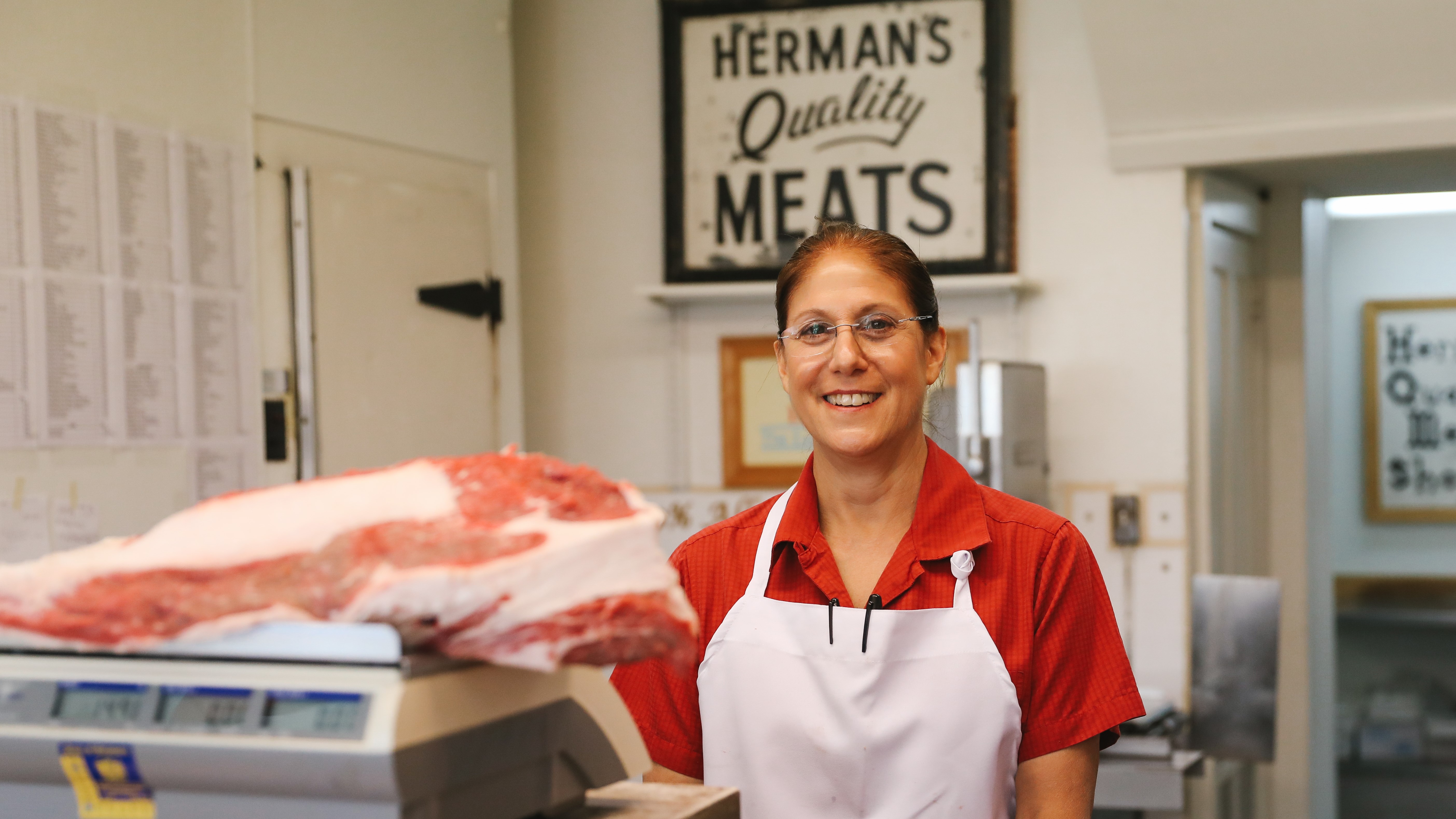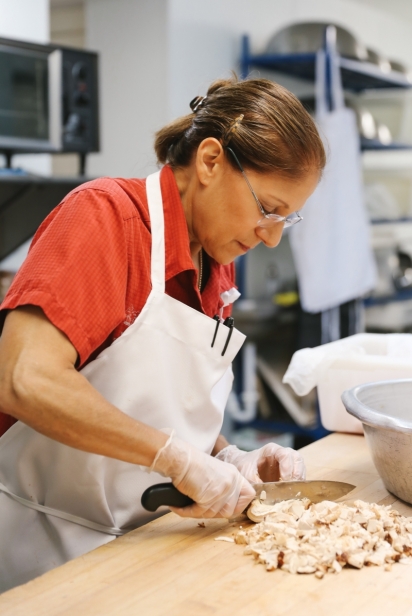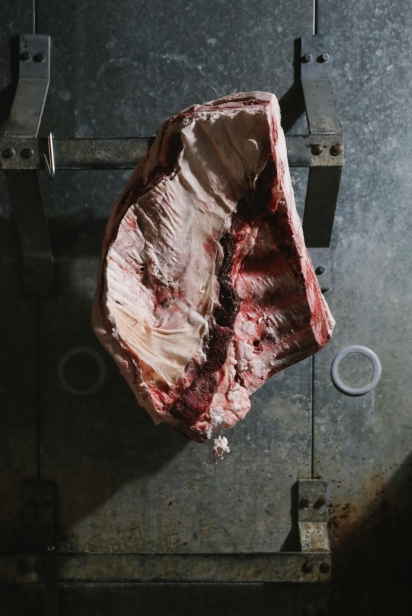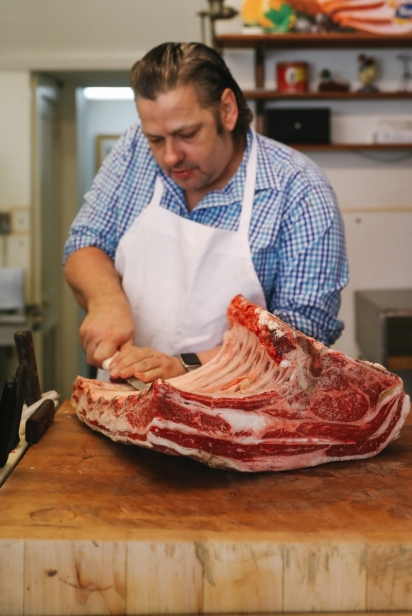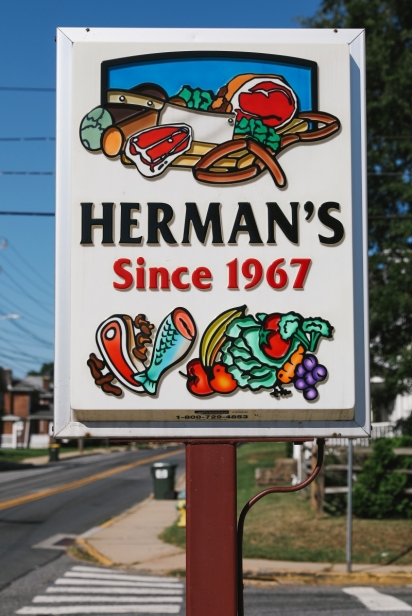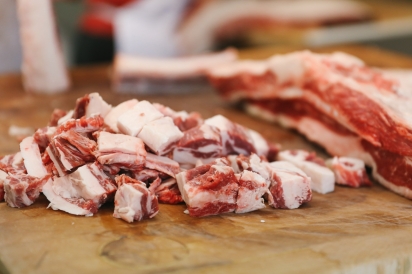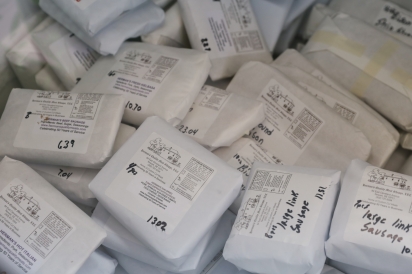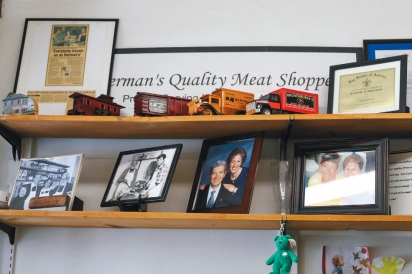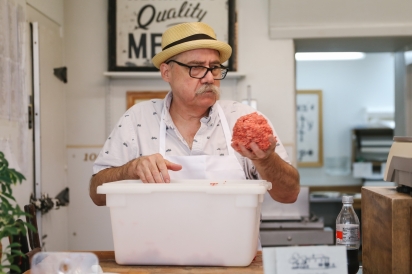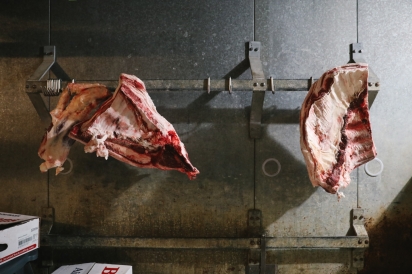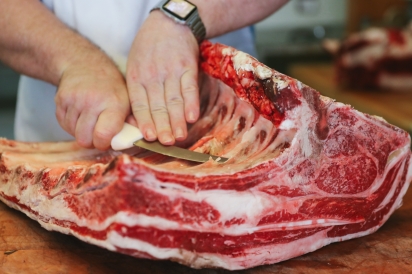Local Artisan Christine Herman: The Butcher of Cleveland Avenue
As Christine Herman, owner and head meat cutter at Herman’s Quality Meat Shoppe in Newark, passes by the wooden counter where an apprentice butcher is finishing off a whole beef filet, she points to a couple of small tags of remaining layer fat and flicks them off with a twist of her knife. After a couple of instructional notes to the young man and a big smile, she passes on, and the filet – now perfectly prepared – is wrapped in paper, priced and ready for payment.
As she later tells me, “Some of my new employees come with meat-cutting skills, but it’s not always done ‘the Herman way.’”
Herman, who looks scholarly in her round, rimless glasses and whose dark hair is pulled back and has streaks of white, did not plan to be a butcher. “I grew up outside Philadelphia in an Italian family. My dad worked for DuPont.” Herman majored in Spanish at the University of Delaware, but after she and Tim married, “He pointed out that he could get home quicker after work if I could help in the shop. I was excited to be a part of the family business, and I liked the camaraderie of working with my husband.”
Christine’s father-in-law, Luther Herman, bought the butcher shop in 1967 when it was still located on Newark’s Main Street. In 1970, he moved it to its present location on Cleveland Avenue, the city’s near-in bypass on the backside of town that morphs into auto-dealer row as it approaches Kirkwood Highway. Luther Herman ran the store with the aid of his son Tim until 1992, when Tim and Christine bought out the business. When Tim died in 2008 after a lingering illness, Christine continued to run the shop, a rare example of a woman butcher.
Walk into Herman’s on the Saturday before a holiday and you’ll find a line of customers ready to pick up orders. If it’s just after opening, the line may actually begin outside the narrow shop’s front door, snake inside past the glass-topped freezer filled with frozen prepared cuts of meats, eventually get up to a wooden counter where two meat cutters are either finishing advance orders or taking care of walk-ins, then turn left past a tall deli case where the office manager is working with a person or two in the back, out-of-sight, locating or preparing orders, and finally ends at the register where Herman, wearing a phone headset, is ringing up sales and perhaps giving a suggestion or two to a customer about preparing the roast or turkey.
“Turkeys are the biggest item for Thanksgiving, as you might expect,” she says, “and we typically might have 400 orders. But we insist on inspecting every turkey that comes into the shop before wrapping them and putting the customer’s name on them.” Of course, there are also lots of orders for roasts, chicken, ducks “and maybe 8 to 10 turduckens.”
For the uninitiated who have never heard of turduckens, and thus have probably not followed John Madden’s spiel during an NFL football broadcast about his Thanksgiving dinner before he retired a decade ago, a turducken is a boneless chicken stuffed inside a boneless duck stuffed inside a boneless turkey – which is then all roasted together. “They take a long time to prepare and are quite expensive,” Herman says, but one doesn’t sense she minds too much that orders have declined in recent years.
About 85 – 95% of holiday items are pre-ordered, usually days in advance, although she shakes her head about the occasional customer who comes in as though suddenly realizing they haven’t ordered anything for a big event scheduled for the next day. Managing inventory is her biggest challenge.
“I have four staff who actively use a knife as well as an office manager and two or three boys who help clean up in the evening,” Herman says. She has four children, none of whom has yet decided to join the family business, although one daughter does serve as a consultant.
The shop officially opens Tuesdays through Friday at 10:30 a.m. and at 9 on Saturdays, but Herman is normally at the store an hour or so in advance. “I do a walk-around to make sure all the refrigeration is working properly,” she says. “If nothing is pressing, I’ll spend 15 minutes or so doing office work, checking emails and online orders.” As we talk before opening on a Tuesday morning, Herman already has the smoker going and meat out of the cooler to warm up in advance. If there has been a delivery the day before, she launches into breaking that down.
She has about five suppliers – “all from the East Coast” – and in addition to meats, the shop carries selected seafood, vegetables and other produce and some prepared foods for sale. “Beef orders have been broken down in advance,” she says, although her butchers have to learn to use the electric saws and grinders to further reduce cuts into workable portions. “Our stock in trade, except for the holidays, is ground beef, steaks and chicken,” Herman says.
“Naturally there have been a lot of societal changes since I first started,” she says. “Back then, there were a lot of stay-at-home moms who shopped at the markets two or three times a week. Now many families are looking for something easy to prepare or else plan to go out for dinner.” She says there are fewer Sunday roasts ordered, but that many of her customers are buying meat for crock pots and small pressure cookers. “Heat and eat is also very popular now – pulled pork, chili, soups, a ton of cold salads, lots of breaded products,” she says, and her prepared dishes cater to that concept.
“Some of my customers are weekend chefs, although when someone picks up an order, I don’t always know who is going to prepare it,” Herman says. “And a lot of families spend part of Sundays cooking – say three dinners and two lunches prepared in advance. Fewer people get home and ask, what are we having tonight?”
Increasingly, she will get orders for game meat – venison, quail, even pheasants, and occasionally orders for more-exotic cuts. “Sometimes, students from the University” – her store is located where there is a lot of University of Delaware foot traffic – “who are from other countries will come in and ask for something unusual, and we always try to work it out.” She also says, “About 5 to 10% of our clientele order meat for their dogs and other pets who may be having digestion problems. And it’s not just bones – it’s expensive meats.”
We discuss how on the West Coast, particularly in the Portland area, there are meat cooperatives that teach consumers how to “break down an animal,” that is to take a side of beef or another carcass and cut it into kitchen-size cuts, as well as a place to order fresh meat in bulk for their families. I ask Herman if she know any other women in the region who are butchers, who cut meat for a living? “Not really,” she says, “but then again, meat-cutting may be a dying art.”
But not as long as Christine Herman, the butcher of Cleveland Avenue, has a knife in her hand and a line of customers stretching outside the door.
Herman’s Quality Meats
64 East Cleveland Avenue, Newark, DE, (302) 731-5344
Tuesday-Friday 10:30 am-5:30 pm; Saturday 9 am-5pm


